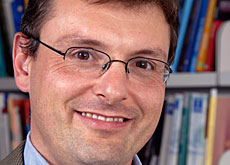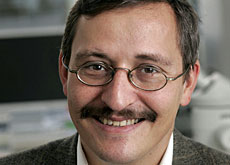Welfare state expert wins top science prize

The winner of this year's Latsis Prize says that traditional welfare state systems have to be remodelled if they are to continue to guarantee western democracies' social cohesion.
But 39-year-old Giuliano Bonoli, a professor of social policy at Lausanne University, tells swissinfo these systems should not be dismantled.
The Latsis award, worth SFr100,000 ($79,000), is one of the most renowned research accolades in Switzerland and is presented each year by the National Science Foundation. It honours the outstanding scientific achievements of a researcher aged 40 or less in Switzerland.
Bonoli, who teaches at the Swiss Graduate School of Public Administration, warns that change is particularly difficult to implement for governments. But he reckons that weakening the social security system or sticking with the status quo would be bad options.
swissinfo: What are the main findings of your research into the welfare state in Europe?
G.B.: They relate to how we should best maintain our welfare state, making it sustainable in the long-term.
If you keep welfare states as they were traditionally designed – as protection against labour market and other social risks – they are going to be very difficult to finance when coping with an ageing population.
Currently there’s a great deal of academic and policy debate into “social investment”. This is where the welfare state promotes employment and access to the labour market for people who have traditionally been on the outside, like non-working mothers, disabled people and older workers.
There is growing evidence that with the right policies it is possible to help more people get into the labour market. This is good news for them, providing cash income, and good news for the financing of the welfare state.
I would say most European leaders probably subscribe to these welfare reform orientations but have big difficulties implementing them. There is a lot of resistance, entrenched interests and financial problems.
swissinfo: Which countries do you consider as models in terms of welfare state policies?
G.B.: Since the mid-1970s, virtually every country in the western world has been shattered by economic and social problems.
In the late 1990s, the Scandinavian countries – like Finland, Sweden and Norway – emerged as examples, combining strong economic competitiveness and generous welfare states.
They are very protective but also oriented towards social investment – with active labour market and childcare policies.
Of course models cannot be easily exported, but every country would gain by looking closely at how these countries have managed to reconcile strong economic competitiveness with very good social protection.
swissinfo: And what about the Swiss welfare system?
G.B.: Switzerland is in a relatively comfortable position. Our pension system will be manageable in the future despite an ageing population. The labour market is also working pretty well.
But there are some worrying indicators like the increase in the number of people claiming invalidity benefit and the growing stock of people getting social benefit that only marginally declines when the economy improves.
The other areas where the Swiss welfare state is in need of reform are childcare and reconciling work and family life. In Switzerland a fairly high proportion of women go to work, but mostly part-time, only one or two days a week.
Very often the reason is that childcare is unaffordable or unavailable and major investment is needed here.
swissinfo: How do you see the welfare state in Europe evolving over the next 50 years?
G.B.: I think the issue of ageing will be the biggest challenge that European countries face in the 21st century.
It’s still not clear how they will cope but it’s certain that ageing will not hit every country in the same way. This is partly due to the question of social investment.
There seems to be a split between countries, which have low fertility rates, essentially the southern European nations as well as Switzerland and Germany – 1.2 to 1.4 children per family – and others like France and the Netherlands, which are much higher with two children per family.
Over the next five to ten years this won’t make much difference but in the next 50 years this will make a hell of a difference. Population ageing in countries where there are higher birth rates will be much more manageable.
swissinfo-interview: Simon Bradley
The Latsis Foundation was created by Greek shipping tycoon John S. Latsis, who died in Geneva in 2003.
Each year it gives out four university prizes valued at SFr25,000, as well as one national and one European Latsis prize worth SFr100,000.
The national prize honours the outstanding scientific achievements of a researcher aged 40 or less in Switzerland.
Giuliano Bonoli is a professor of social policy at the Swiss Graduate School for Public Administration in Lausanne.
He received his PhD at the University of Kent for a study on pension reform in Europe. He also studied at Geneva and Leeds universities.
He has been involved in several national and international research projects on the process of welfare state transformation, in particular on pension reform and has published extensively on these issues, as well as on the labour market and family policies.
Besides Lausanne, he also teaches at Basel University.

In compliance with the JTI standards
More: SWI swissinfo.ch certified by the Journalism Trust Initiative



You can find an overview of ongoing debates with our journalists here . Please join us!
If you want to start a conversation about a topic raised in this article or want to report factual errors, email us at english@swissinfo.ch.